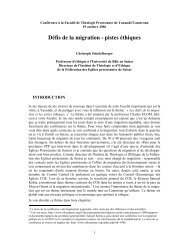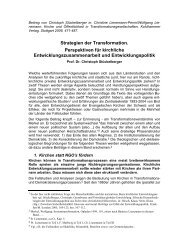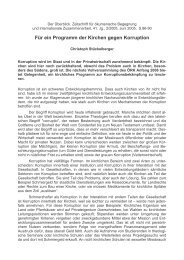BREAK THE CHAINS OF OPPRESION AND THE YOKE OF ...
BREAK THE CHAINS OF OPPRESION AND THE YOKE OF ...
BREAK THE CHAINS OF OPPRESION AND THE YOKE OF ...
You also want an ePaper? Increase the reach of your titles
YUMPU automatically turns print PDFs into web optimized ePapers that Google loves.
Ethics ed the following recommendation to its member churches: “As our commitment<br />
on confessing our faith in the face of economic injustice and ecological<br />
destruction, ... WARC recommends ...: 2.2 Support governments to achieve<br />
fair and sufficient taxes in order to guarantee basic needs and a life of dignity<br />
for the population, to reach the UN Millennium Development Goals and to<br />
fulfil the obligation of providing social welfare. … 2.6 Enforce present and create<br />
new laws against all forms of criminal economic activity such as … tax evasion,<br />
money laundering and illegal employment, which deny the rights of the<br />
poor.” 13<br />
Tax justice is the key value of tax ethics. As outlined below, the following principles<br />
can be seen as global principles of tax justice while respecting that their<br />
implementation still allows contextual and diversified tax systems and even to<br />
some extent a tax competition between states or regions. Tax ethics is and has to<br />
be implemented in various tax principles as they are known, or should be further<br />
developed in tax laws:<br />
1. The Principle of Generalness: every taxable citizen is obliged to pay taxes as<br />
an expression of equal treatment and justice as equality.<br />
2. The Principle of Capability: Tax payers should be charged on the basis of<br />
their economic capability and performance. This is an expression of capability-related<br />
justice and performance-related justice. Wealthy persons<br />
should contribute more to common public tasks than poor persons, not<br />
only in absolute, but also in relative terms.<br />
3. The Principle of Regularity: the state cannot take taxes in an arbitrary<br />
way, but has to tax based on predictability which is part of procedural justice.<br />
4. The Principle � of �Redistribution: � Progression � in �taxing<br />
income or revenue<br />
leads to a relative higher taxation of wealthy than of poor people. This is<br />
ethically justified because the needy, such as people without food or education,<br />
need support. Needs-related justice means distributive justice, also<br />
called social justice, which respects differences in performance while balancing<br />
the needs of those who cannot perform in the same way such as<br />
elderly, poor, handicapped and sick.<br />
5. The Principle of Coherence: The different forms of taxes and policies have to<br />
be coherent and non-contradictory. It would be incoherent to reduce, e.g.<br />
income taxes for poor people, and at the same time charge them with additional<br />
consumer taxes. Coherence is an ethical requirement for credibility<br />
and trust as well as for a holistic implementation of a set of values. Nevertheless,<br />
full coherence is never possible because politics is always a battle<br />
field of balancing conflicts of interests, compromises and contradictions.<br />
13 Accra 2004. Proceedings of he 24th General Council of he World Alliance of Reformed<br />
Churches, Geneva 2005, 199-201.<br />
��������������������������������������������<br />
� � � � ������������������� �<br />
– CLIMATE JUSTICE <strong>AND</strong> TAX JUSTICE – 91










